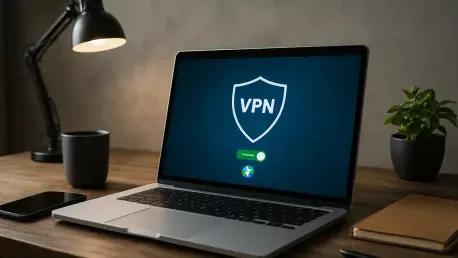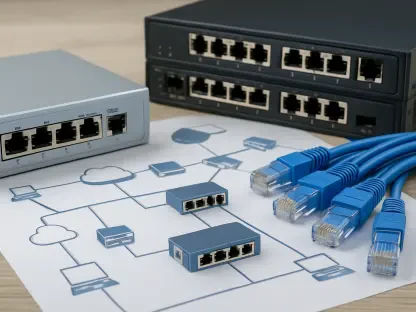In an era where digital privacy feels increasingly under siege, millions of users turn to Virtual Private Networks (VPNs) as a supposed shield against online threats, believing these tools will encrypt their connections and cloak their activities from prying eyes, but a closer look reveals a troubling reality. Beneath the glossy marketing promises lies a concerning truth that demands scrutiny. Recent research and expert analyses reveal that VPNs may not offer the comprehensive protection users expect, with vulnerabilities in consumer-grade applications and even instances of malicious software disguised as VPN extensions surfacing in alarming numbers. This raises a critical question about whether these widely trusted tools are truly safeguarding personal data or merely providing a false sense of security. Diving deeper into the limitations and risks associated with VPNs, this exploration seeks to uncover the truth behind their capabilities and assess if they genuinely deliver on the promise of online privacy in today’s complex digital landscape.
Unmasking the Myth of Absolute Protection
The appeal of VPNs often stems from their ability to encrypt internet traffic and mask IP addresses, creating an illusion of invisibility online. However, cybersecurity specialists caution that this protection is far from absolute, as many VPNs—particularly free or unverified ones—fall short of rigorous security standards. A significant concern lies in the absence of independent audits for numerous consumer VPN applications, which can result in weak encryption protocols or hidden vulnerabilities. Such flaws expose users to potential data leaks, especially when personal devices are used for accessing sensitive information in remote work environments. The risk is not just theoretical; countless reports have highlighted how poorly designed VPNs fail to prevent breaches, leaving users unknowingly exposed to malicious actors who exploit these gaps with ease. This underscores a broader issue: the overreliance on VPNs as a sole defense mechanism can lull users into complacency, ignoring other critical aspects of digital security that remain unprotected.
Compounding this problem is the misconception that all VPNs are created equal, a belief that can lead to disastrous choices. Many users gravitate toward free or low-cost options without considering the potential trade-offs, such as invasive data collection practices or inadequate encryption methods. Experts point out that even paid VPN services can harbor flaws if they lack transparency about their security practices or fail to undergo regular third-party evaluations. For individuals working remotely, the stakes are even higher, as a single breach on a personal device could compromise an entire corporate network. This vulnerability highlights the need for greater awareness about the limitations inherent in VPN technology. Rather than viewing these tools as a complete solution, users must recognize them as just one layer of defense in a much broader strategy, prompting a reevaluation of how digital privacy is approached in an increasingly interconnected world.
Rethinking Security Beyond Encrypted Connections
While VPNs focus on securing the pathway through which data travels, a growing consensus among experts suggests that this approach alone is insufficient to ensure true protection. The real challenge lies in safeguarding the data itself, regardless of the connection’s security status. Innovative techniques such as remote rendering and isolated execution environments are emerging as vital solutions, allowing data to remain protected even if a VPN fails or a connection is intercepted. This shift in perspective moves away from traditional perimeter-based security models, which VPNs epitomize, toward content-level defenses that prioritize the integrity of information over the mere act of transmission. As cyber threats evolve to target sensitive content directly, relying solely on connection encryption becomes a risky proposition, necessitating a more comprehensive framework that addresses vulnerabilities at every stage of data handling.
This evolution in security thinking also reflects a broader realization that VPNs cannot address every aspect of digital risk. For instance, even with a secure connection, data stored on a device or accessed through an application remains vulnerable if proper safeguards are not in place. Cybersecurity leaders advocate for multi-layered strategies that combine endpoint protection with advanced governance policies to ensure no single point of failure can compromise an entire system. Such an approach might include restricting access to critical data based on user roles or implementing strict controls over how information is shared and stored. By focusing on content rather than just connectivity, both individuals and organizations can better mitigate the risks that VPNs alone cannot cover. This paradigm shift is not just a technical adjustment but a fundamental change in how digital security is conceptualized, urging a proactive stance against threats that are becoming increasingly sophisticated.
Navigating the Corporate Dangers of Personal VPNs
In corporate settings, the use of personal VPNs by employees introduces a host of challenges that can jeopardize organizational security. These tools often obscure network visibility, making it nearly impossible for IT teams to detect unusual activity or enforce compliance with established protocols. Cybersecurity professionals draw parallels between personal VPNs and deceptive credentials, noting how they create blind spots that erode trust in security measures. Such scenarios can lead to “impossible travel” anomalies, where user locations appear inconsistent with reality, further complicating threat detection efforts. To address these risks, companies are encouraged to implement stringent access controls, including multi-factor authentication, and to establish clear policies that limit the use of unmanaged VPNs, ensuring that only approved solutions are utilized for accessing sensitive systems.
Beyond visibility issues, personal VPNs also pose significant compliance challenges for enterprises striving to meet regulatory standards. When employees use unapproved tools, IT departments lose control over encryption keys and access logs, creating potential liabilities in the event of a data breach. Experts recommend that businesses adopt a zero-trust architecture, which assumes no user or device is inherently trustworthy, regardless of whether a VPN is in use. This model, combined with robust asset management practices, ensures that every interaction with corporate resources is verified and monitored. By prioritizing company-approved VPNs and enforcing acceptable use guidelines, organizations can mitigate the risks associated with personal tools while maintaining a balance between employee privacy and corporate security. This proactive stance is essential for navigating the complexities of modern cybersecurity, where personal choices can have far-reaching implications for entire networks.
Adapting to a New Era of Digital Defense
The cybersecurity landscape is undergoing a profound transformation, with a clear trend moving away from treating VPNs as a standalone solution toward integrating them into a more robust security architecture. As digital threats become more advanced, targeting data directly rather than just the pathways it travels through, experts stress the importance of endpoint management and content-level protection. Governance policies that define how data is accessed and handled are also critical, ensuring that vulnerabilities are minimized at every touchpoint. This holistic approach acknowledges that VPNs, while useful for specific purposes, cannot keep pace with the sophistication of modern cyberattacks on their own. Instead, a combination of tools and strategies is necessary to build a resilient defense against an ever-changing array of risks.
This shift also highlights the need for education and awareness at both individual and organizational levels to adapt to emerging challenges. Many users remain unaware of the limitations of VPNs, often assuming that installing one equates to complete protection against all online threats. Cybersecurity advocates call for better resources to inform the public about the role VPNs play within a larger security framework, encouraging the adoption of complementary measures like secure browsing habits and regular software updates. For businesses, investing in employee training and advanced security technologies is paramount to staying ahead of potential breaches. As the digital environment continues to evolve, so too must the strategies employed to protect it, ensuring that reliance on any single tool does not become a liability in the face of increasingly complex and persistent cyber threats.
Building Stronger Safeguards for Tomorrow
Reflecting on the insights shared, it becomes evident that VPNs, while valuable for encrypting connections, fall short of being the ultimate privacy solution many had hoped for. Experts consistently point to vulnerabilities in consumer-grade products and the unique risks personal VPNs pose to corporate environments as reasons for caution. Looking ahead, individuals should take practical steps by selecting VPNs with proven security credentials, such as strong encryption and independent audits, while supplementing these tools with updated software and mindful online behavior. For organizations, the path forward involves adopting multi-layered security frameworks that prioritize data protection over mere connection security, alongside enforcing strict controls over VPN usage. By integrating endpoint visibility, content-level safeguards, and robust governance, both users and businesses can build a more resilient defense. These actionable measures ensure that the lessons learned from past overreliance on VPNs pave the way for smarter, more comprehensive approaches to digital privacy.









